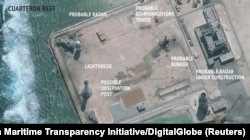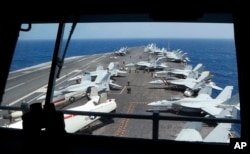Recently, an Iranian oil tanker exploded and sank after hitting a Chinese ship in the East China Sea.
Investigators are still looking for a cause of the accident. But there is little hope of finding any of the tanker’s 32 crew members alive.
What are the chances of a similar accident in the South China Sea?
Experts say widespread surveillance, experienced crews, and the possibility of a code of conduct make the South China Sea relatively safe for shipping.
Private ships such as oil tankers have already used detailed maps while sailing close to coastlines. Those ships can sometimes enter a disputed area of the 3.5 million-square-kilometer sea. When that happens, experts say, modern equipment is able to recognize any accidents.
Shared experience
Six governments have competing claims in the South China Sea, which acts as a pathway for one third of the world’s shipping traffic. Goods shipped in 2016 were worth $3.37 trillion. That estimate comes from the Center for Strategic and International Studies, an American-based research group.
Operators of ships have the experience to avoid disputed waters where possible, said Collin Koh, a maritime security specialist at Nanyang Technological University in Singapore.
But during powerful storms, high waves or the sudden passage of military ships, shippers can still face disaster risks, experts say.
The number of claimants, and their concerns about other claimants, have increased surveillance operations in the South China Sea. Huang Kwei-bo of Chengchi University in Taipei noted that pirates and terrorists are rarely reported in the sea, unlike in other waterways.
China is the strongest of the claimants, with the country expanding its control since 2010.
Chinese often send coast guard ships throughout the waterway. Now China is reportedly building radar systems on as many as three small islands in the sea’s Spratly archipelago. That information comes from researchers at the Asia Maritime Transparency Initiative.
Chinese state media say the country plans to launch 10 satellites over the sea from 2019 to 2021.
Safety against sovereignty
While the other claimants oppose Chinese expansion into their maritime exclusive economic zones, they normally set aside disputes in times of crisis, Koh said.
Accident prevention “is really the collective (responsibility) of everyone,” he added. “Governments usually issue notices to mariners and shippers on a real-time basis.”
Taiwan has rescued ships from Vietnam, which controls small islands near the Spratlys, coast guard officials in Taipei say. In 2015, Taiwan announced that development work on the island, called Taiping or Itu Aba, would be used for humanitarian and disaster assistance.
In 2016, navies from the United States and Vietnam started an exchange to guard against unplanned hostilities among ships in East Asia and the Pacific. The U.S. military newspaper Stars and Stripes reported on the exchange.
The United States does not claim any part of the South China Sea.
A few years ago, China’s decision to deploy an oil rig in the sea led to clashes between Chinese and Vietnamese boats. Now, relations between the two sides are much improved. In 2016, China and Vietnam added search-and-rescue operations to the duties of their joint naval patrols in the shared Gulf of Tonkin.
In August of 2017, both Malaysia and Singapore helped rescue people from an accident between a U.S. naval destroyer and a Nigerian-registered tanker.
Code of conduct
A code of conduct for the South China Sea would help improve accident prevention and reaction times for emergencies without affecting the sovereignty disputes, ASEAN officials said last year. It is not clear whether the code will extend to private tankers and trade ships, notes Huang Kwei-bo. He is vice dean of the College of International Affairs at National Chengchi University in Taipei.
“I think to take disaster management or crisis management, and then for oil tankers to use that in the (code of conduct), that’s a very justifiable thing,” he added.
The code will be based on a declaration made by the Southeast Asian nations in 2002. The Chinese government resisted recognition of the measure until last year.
Collin Koh predicted that the code of conduct will include wording on humanitarian efforts. “I think this is one of those lower-hanging fruits that were already floated around amongst ASEAN as well as China on the South China Sea,” he added.
“I don’t think this may be a big issue when it comes to the South China Sea, because I think first foremost the imperative is always a humanitarian approach to any such contingency before we talk about sovereignty and all other sort(s) of issues,” he said.
I'm Mario Ritter. And I'm Lucija Millonig.
Ralph Jennings reported on this story for VOANews.com. George Grow adapted his report for Learning English. Hai Do was the editor.
_____________________________________________________________
Words in This Story
surveillance – n. intelligence gathering
code of conduct – n. set of rules
maritime – adj. of or related to the sea
pirate – n. a person who attacks and steals from ships
zone – n. area
sovereignty – n. right of self-rule or self-control
We want to hear from you. Write to us in the Comments Section.








